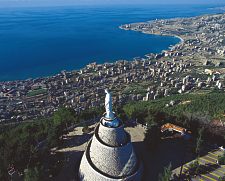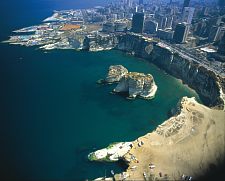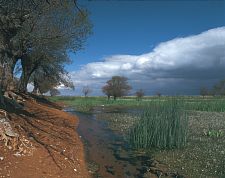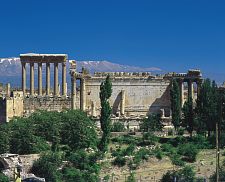|





| |
From Yaron to Yale
by Carl Y. Saab* (May 4, 2005)
A case of misunderstanding
‘You have an accent; where are you from?’ is the typical question I’m asked when
I meet someone in the U.S. I might even be asked next ‘where from in Lebanon are
you?’ or ‘are Christians and Muslims still killing each other over there?’
I was born and raised in Beirut, Lebanon, but my passport mentions Yaron as the
town of my birthplace instead. That is a dominant Lebanese custom, to mention
birthplaces by towns where one’s family seems to have originated from. I spent
many summers in Yaron getting to know my village, my family members and my land.
We played soccer most of the time and brought many soccer balls to the field
that sits on a cliff. Whenever the ball fell off the cliff, we would quickly
replace it with another. Attempting to retrieve that ball was out of the
question; Israeli army would shoot you for trespassing.
I left Lebanon during the war and carved a path of resistance for myself,
against poverty and ignorance, ending up somehow at the prestigious Yale
University at one point in my career. Looking back at events leading to my
immigration and academic achievements, I wonder how many southerners could have
possibly followed in that same path, and what gigantic hurdles they had to
surmount to break away from that cycle of poverty, ignorance and violence.
Yaron in peace
Yaron is a peaceful town elevated few hundred meters above sea level, to the
very south of Lebanon, not far away from the Mediterranean sea. It’s a rural
village on the borders with Israel. In fact, Yaron was occupied by Israel, with
a bunch of other neighboring southern Lebanese towns. With a Jewish name in
origin (just like Yale), Yaron is home to Muslims and Christians. Before being
invaded by Israel, inhabitants tell stories of clashes between Palestinian
fighters and retaliation by Israeli Jewish settlers and terrorist organizations
against these fighters, with civilians caught in between. That is just engraved
in the psyche of every Yaron villager.
Prior to military aggression, my family members in Yaron worked their lands from
dusk till dawn. They, like most Lebanese southerners, ended their long days
praying for rain and warmth to yield good crops, some to feed on, some to sell
(mostly tobacco leaves), some to dry and ration for winter. Almost everybody
depended on agriculture (and God) for survival. Nothing extraordinary I could
sense as a kid in the religiosity of my family. Everyone basically prayed for
healthy life, and decent end-of-life. Theology occupied center stage in the
social fabric and as spiritual appeal to natural elements. Christians and
Muslims celebrated life in comparable ways, and communicated with God in private
and in public through one mosque and one church. Apart from occasional
skirmishes over a broken sprinkler system or disputed water wells here and
there, Yaron was truly at peace. Christians and Muslims were not killing each
other.
Yaron in war
For many years, I could not get to Yaron freely. The homes and lands we own by
inheritance there were occupied by Israel. The Israeli military issued special
passes to few people only to visit the occupied towns under special conditions
(I did however manage to visit elderly family members on their deathbeds for
very short visits). Otherwise, our ties with Yaron were almost completely
severed at different time points. Even telephone lines were cut off, or at best,
if existent, were wiretapped. Yaron’s inhabitants suffocated, but the doors to
immigration were open to them, or rather facilitated by Israel for a good
reason: fewer people, lesser resistance to occupation.
As such, inhabitants of southern Lebanon, like those of Yaron, were mostly
either occupied by Israel, or, even if not occupied, subjected to the wrath of
the Israeli army in retaliation to resistance fighters. Yaron was suddenly
caught in the crossfire, and cut off from the rest of the world, occupied by
foreign forces, and drained from its manpower.
Guerilla tug-of-war lasted for years between Israeli soldiers and fighters
including Palestinians (many factions thereof), communists, religious
fundamentalists, the disenchanted and the oppressed. But another form of silent
resistance was brewing and overshadowed by the heavy sounds of machine guns and
cannons. Inhabitants of occupied villages occasionally engaged the occupier with
kitchen knives or rallied peacefully. Although many refused to collaborate with
the enemy, some did, and an Israeli-backed militia was born in southern Lebanon.
Free at last
Until one day the Berlin wall fell, the Soviet Union collapsed, and the civil
war in Lebanon ceased. The reconstruction phase of Lebanon was initiated.
Unfortunately, many Lebanese villages were still occupied. In addition, Syrian
troops were still present in Lebanon under an expired mandate (to the point that
many Lebanese actually viewed Syrian forces as occupiers as well).
Notwithstanding, tug-of-war in southern Lebanon continued mainly between two
parties: a highly organized, well-trained, disciplined and religiously
homogenous group of fighters with modest military means against Israeli military
might and its backed Lebanese militia.
At about the dawn of the new millennium, Israel withdrew from southern Lebanon
with the fighters leading the resistance claiming victory. The Israeli-backed
militia disintegrated. More recently,
Syrian forces also withdrew from Lebanon (ironically precipitated by the
assassination of the Lebanese ex-prime minister responsible for post-war
reconstruction).
The liberation of Yaron and the rest of south Lebanon seems like a classic tail
of resistance, written in blood and many other significant sacrifices. However,
some basic facts strip its liberation from the classic romanticism of
post-colonial independence and liberation movements.
Occupied or free, but always abandoned
Prior to military aggression, Yaron had no sanitary planning, no telephone
cables, no decent health care or major hospital less than an hour drive, no
postal service, no local police (not even serious border patrol!), no reliable
electricity, and no school. In fact, students had to travel to the neighboring
village on foot, walking for hours everyday, to go to school. Other major
Lebanese cities, however, did not share Yaron’s miserable fate. Pre-war
infrastructure in Beirut and other northern cities allowed a life of luxury,
reminiscent of Nice and Monaco.
Yaron was abandoned by the Lebanese government way before it was occupied by
Israel, and offered to Palestinian fighters. For Palestinian fighters, the way
to Jerusalem passed through Yaron, while the path to Arab nationalism shied away
from Yaron. Only senior citizens lived in Yaron during the occupation, surviving
on meager income from youths in the Diaspora.
It’s been five years since Israel lifted its mighty grip off south Lebanon,
enough time to launch reconstruction and build a hospital, a school, attend to
farmers needs, provide agricultural loans, install border patrols, restore
reliable electricity, sanitation and support the local municipality. Today,
however, villagers in Yaron are faced with unfortunate disparities, once again,
and utter negligence, verging on the conspiratorial.
Beirut woke up from war to be the world’s largest and most audacious
reconstruction site, whereas Yaron woke up from occupation to a sad void,
poverty, and identity crisis. With no manpower to work the land, mixed with
controversial agrarian laws ignoring farmers’ rights and protection of local
goods from foreign competition, villagers in Yaron face life with utter
indifference; they can’t work their lands, and they have to pay for their food
and goods with money they’ve got to earn from somewhere. But Yaron is not used
to market economy, it’s just not made for import/export or billboards!
Identity crisis
Villagers of Yaron woke up one glorious day free from occupation, and into the
arms of resistance fighters. No government official could be spotted anywhere in
Yaron even five years through liberation. No government military personnel were
deployed anywhere in Yaron. And since resistance fighters filled the power
vacuum precipitated by the withdrawal, tension was running high in the first few
weeks post-liberation. The fighters, albeit highly disciplined and acclaimed for
their good deed and utmost constraint (no reprisal against ex-collaborators),
represented a homogenous and extreme religious group threatening the fragility
of a lightly religious and mixed social fabric.
Although these fighters did contribute to rebuilding, and basically substituted
for the government’s handicap on many levels, their agenda was by default
sectarian, confessional, and simply cannot sustain a viable enterprise without
external foreign support (hence arguably foreign intervention as well).
Arguably, in the absence of the Lebanese army, these fighters are seen as
securing the villagers against potential Israeli threats.
Today, if you happen to be between 15 and 18 years old in south Lebanon, and
serious about planning for your future, you basically have the following
options: Either you turn to Beirut for a pitiable education if you got no
savings (to later compete with graduates of private universities whom themselves
are facing unemployment), you join the ranks of the resistance movement (unclear
resistance objectives but you ultimately graduate as a martyr), or you beg at
the doors of Embassies for immigration visas.
What is the Lebanese government waiting for?
If you lean toward conspiracy theory, you might assume that Yaron’s
disenchantment was a devilish scheme to turn south Lebanon into a surrogate
Palestinian homeland, while religious fundamentalism breads on poverty and lack
of education (all responsibilities the government denies). Perhaps, but it is
safer to assume that, even with such a conspiracy unveiled, Lebanese government
still refuses even today a United Nations’ invitation to assume its basic
humanitarian and military duties to a part of Lebanon that arguably expands over
half of its sovereign territories!
Today, sectarian discourse ravages political life and risks dire economic and
even military consequences in Lebanon. Theology alone cannot build a viable
modern state. The youths should be offered models other than the exclusively
religious, and feel welcome to the heart of Lebanese civic life, with all
privileges and opportunities endowed to other fellow Lebanese. The tale of
reconstruction of Lebanon is a tale of two cities; one is in Beirut and the less
fortunate one to the south, north and east of Beirut.
The Lebanese government failed to live up to its mission to protect and serve
the people, all the people. Israel made itself known to be the aggressor.
Palestinian fighters cared less for Israeli retributions. Syrian regime hijacked
parts of Lebanon to negotiate Israeli-occupied Syrian territory. But the
Lebanese government initially set the stage for all of these players on Lebanese
soil, mainly in the south.
Free our borders, decentralize Lebanese state powers
Leaving Beirut, driving in any direction will put you in Syria or Israel in less
than 3 hours (unless you chose west for a dip in the Mediterranean). Almost
invariably, all towns on the borders with these two countries (friend or foe)
share the miserable fate described above, and identity crises similar or mirror
images thereof.
It is time for major decentralization of state powers from Beirut outward in all
directions. Prerequisite steps include extending full Lebanese sovereignty and
authority over all Lebanese territory beyond rhetoric. Lebanon’s limbs are
paralyzed and in need of rehabilitation. Lebanon’s borders should prosper for
the whole country to stand on its feet and reach out with open arms to all its
neighbors. We, Lebanese, are technically not at war with any other nation. It is
time we live this peace, and spread this aura throughout the entire region.
While sectarianism dominates political life in Lebanon and escalating,
especially with elections due soon, there is little hope of patching things up
in the south. By patching things up, it is meant tackling the core issues of
development on all levels, and a promise of a brighter future for the youths
other than unemployment, immigration or martyrdom.
Democracy as road to peace
Who among the candidates running for parliamentary seats will propose a
comprehensive agenda for sustainable reforms in the south?
What about the disenchanted eastern and northern Lebanese towns? It is time we
recalibrate our compass to point away from Beirut towards our borders. Let’s
send a strong message of peace and prosperity from our borders to our neighbors
so we could eventually bridge between them.
Lebanon could well lead the entire Middle East towards peace and harmony through
democracy, and democracy requires treating all citizens equally, wherever they
are, even if they are at the borders, or thousands of miles away from home
resisting ignorance and prejudice and extremism, abandoned to their own devices
in a foreign land.
Today, having been away from Lebanon for 8 years, I share that same loneliness
and disappointment with my family, who never left Lebanon, but Lebanon left them
at the borders, and us abroad.
*Carl Y. Saab was born in 1971 and raised in Lebanon. He graduated from the
American University of Beirut (AUB) with B.S. and M.S. degrees. He then traveled
to the United States where his petition for Permanent Resident was approved by
the U.S. government in the category of ‘Alien with Extraordinary Ability’. He
obtained his Ph.D. degree from the University of Texas and completed his
three-year fellowship at Yale University, Department of Neurology. Carl was
appointed visiting lecturer at AUB, School of Medicine, and currently serves as
Assistant Professor of Research at Brown University, Department of Surgery,
pursuing basic science research in the field of neuroscience.
|